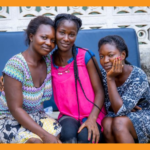The Alliance for Reproductive Health Rights (ARHR) joined the National Population Council (NPC), the United Nations Population Fund (UNFPA) Ghana, and relevant stakeholders to commemorate this year’s World Population Day in an event in Accra.
The commemoration was under the global theme “Unleashing the Power of Gender Equality: Uplifting the Voices of Women and Girls to Unlock the World’s Infinite Possibilities” and the national theme “Unleashing the Power of Gender Equality to Spur Development”. It highlighted the urgent need to advance gender equality and help realize the dreams of all people in our world. Most importantly, the commemoration explored opportunities and strategies to enhance the rights and choices of women and girls in Ghana for national development.
UNFPA’s flagship 2023 State of the World Population (SWOP) Report was launched. The SWOP Report provides guidelines for policy-making, advocacy, programming, research, monitoring, and evaluation of our world’s development agenda. The report titled “8 billion lives, infinite possibilities, the Case for Rights and Choices” provides an in-depth analysis of the demographic trends affecting sustainable development worldwide. It explores the possibilities 8 billion people will offer to the world and examines the challenges that must be overcome to achieve this demographic dividend, including the need for holistic sexual and reproductive health services, investments in education, job training, and gender equality. The report reiterates the need to invest in these areas as a critical component for sustainable development, human rights, and social justice.
The growth of the global population was revealed to have been parallel to the increase in Ghana’s population growth. Young people and adolescents account for more than 56% of Ghana’s population and the population of women and girls is far more than 50% of the total population. This calls for increased investment in the health and education of these groups of people while providing them with opportunities for decent work to enable them to contribute to the economic growth and overall social development of the country.
Discussions among stakeholders during the commemoration revealed that there was still a long way to go in advancing and protecting the sexual and reproductive health and rights of women and girls. Also, a huge percentage (44%) of partnered women in 68 countries were unable to exercise freely their right to reproductive choice as measured by SDG indicator 5.6.1 (UNFPA, 2023).
Proposal to declare the month of July as a national population month was made and agreed upon by consensus. The need to do an intersectional analysis of the needs of women and girls was made as women and girls may have different needs. The inclusion of marginalized and vulnerable groups, including persons with disabilities, in policy-making and national development was emphasized.
Participants included Civil Society, Academia, the Private Sector, Members of Parliament, Ministers, Youth Groups, Persons with Disabilities, and the media.



